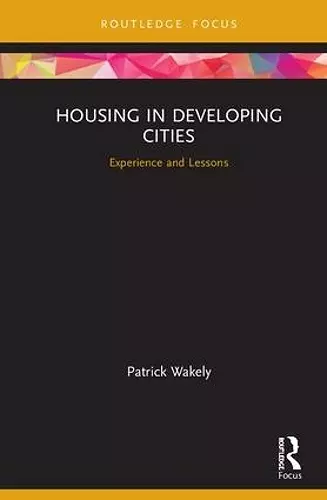Housing in Developing Cities
Experience and Lessons
Format:Paperback
Publisher:Taylor & Francis Ltd
Published:8th Nov '19
Currently unavailable, and unfortunately no date known when it will be back
This paperback is available in another edition too:
- Hardback£56.99(9781138572089)

Universally, the production, maintenance and management of housing have been, and continue to be, market-based activities. Nevertheless, since the mid-twentieth century virtually all governments, socialist and liberal alike, have perceived the need to intervene in urban housing markets in support of low-income households who are denied access to the established (private sector) housing market by their lack of financial resources.
Housing in Developing Cities examines the range of strategic policy alternatives that have been employed by state housing agencies to this end. They range from public sector entry into the urban housing market through the direct construction of (‘conventional’) ‘public housing’ that is let or transferred to low-income beneficiaries at sub-market rates, to the provision of financial supports (subsidies) and non-financial incentives to private sector producers and consumers of urban housing, and to the administration of (‘non-conventional’) programmes of social, technical and legislative supports that enable the production, maintenance and management of socially acceptable housing at prices and costs that are affordable to low-income urban households and communities. It concludes with a brief review of the direction that public housing policies have been taking at the start of the 21st century and reflects on 'where next', making a distinction between ‘public housing’ and ‘social housing’ strategies and how they can be combined in a ‘partnership’ paradigm for the 21st century.
"Patrick Wakely draws on 40 years of experience to examine the range of policy alternatives used by States to intervene in urban housing markets in support of low-income households. This is much needed."
Emma Wragg, International Journal of Urban Sustainable Development
"Wakely uses his unique understanding and vast experience to bring clear and practical solutions to the vexed challenge of housing in developing countries. Whereas most written policies typically benefit a small minority – the middle class and civil servants – Wakely’s approaches empowers the urban poor, both as users and producers of housing. This should be required reading for practitioners and policy makers alike."
William Cobbett, Director, Cities Alliance
"Patrick Wakely’s new book is nothing short of the book that we all need in order to understand both how the huge growth in cities in the developing world is being managed, and how communities on extremely low incomes are getting by; providing their own housing with some public support and progressing their life chances. It is an invaluable guide to both the experience of housing in developing cities and the importance of recognising the potential of informal and semi-formal urban development, combined with a guiding public hand. I hope this book will help many people understand this dynamic process, as it will certainly help me."
Anne Power, Professor of Social Policy and Head of LSE Housing and Communities, London School of Economics
"This book is an excellent synopsis of fifty year's of practice in the provision of housing in developing countries. Patrick Wakely brings wide and thoughtful experience to this subject. The book focuses on 'the how' housing has actually been created and for whom. It is a needed counterpoint to the declaration of global goals which focus on the 'what'."
Michael Cohen, Professor of International Affairs, The New School, New York
ISBN: 9780367220280
Dimensions: unknown
Weight: 453g
160 pages